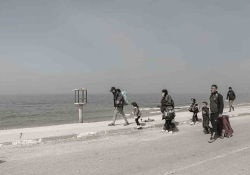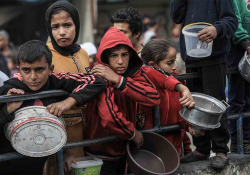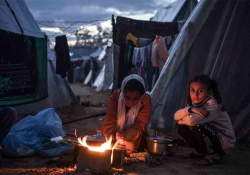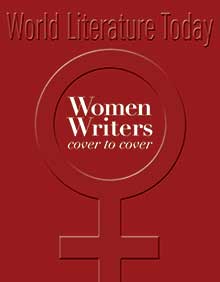Of Gatekeepers and Bedtime Stories: The Ongoing Struggle to Make Women’s Voices Heard
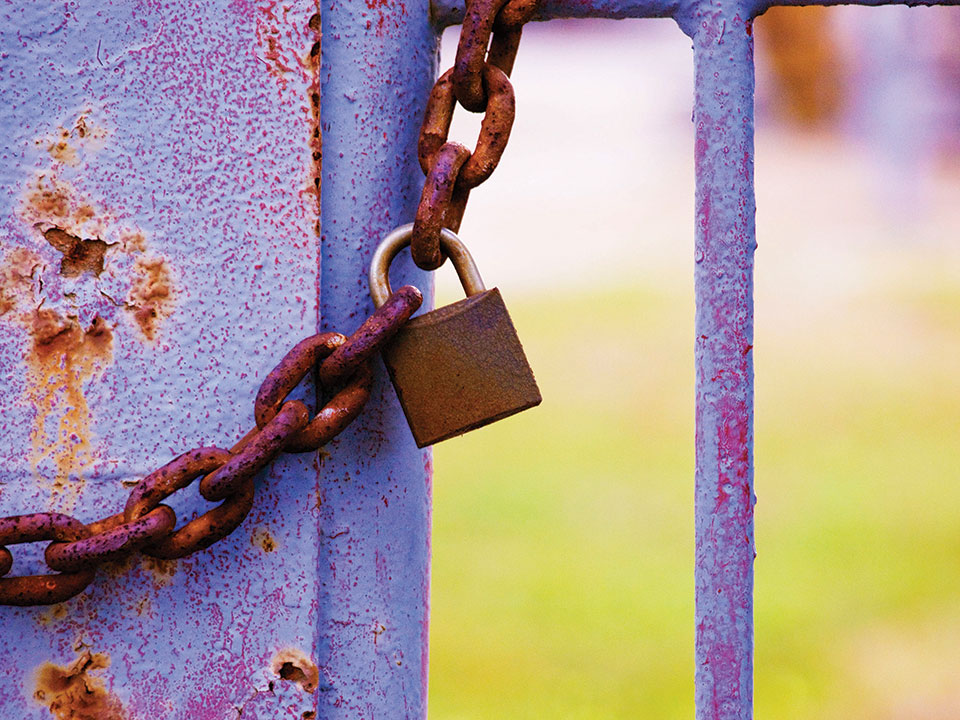
Do we need a special issue devoted solely to women writers? Indeed we do. Author and translator Alison Anderson explains why.
Do we still need magazines, anthologies, prizes, and publishers’ lists devoted solely to women writers? For a start, have recent electoral events not shown that women now have access to the highest position of power in the world, that the glass ceiling . . . etc.? Don’t we know that women have been winning the Nobel Prize, the Pulitzer, the Booker in increasing numbers? Can we not just relax and read people and put all this gender debate, at least as far as something as relatively benign as literature is concerned, behind us?
No. And the reason why we cannot may lie, precisely, with the readers who ask themselves these questions.
When the then-“Orange” Prize for Women (now the Baileys Women’s Prize for Fiction) was created in 1996 in the UK, there were dissenting voices, including that of A. S. Byatt, who maintained that the prize was sexist, defeating its very purpose by ghettoizing women in a category of literature that was both different and exclusive. This was not the intention of the prize’s founders, which was rather to redress a situation—and call attention to it: namely, that women were woefully and systematically underrepresented on the shortlists of literary prizes. The Stella Prize was similarly created in Australia in 2013 in response to the all-male shortlist two years earlier for the country’s leading literary prize, the Miles Franklin (ironically named for one of Australia’s pioneering women authors). If Australia, the second major country on the planet to grant women the right to vote, had a “literary gender problem” as recently as 2011, what does this mean for the status of women writers both in the Anglo-Saxon world and globally?
Are women writers, figuratively speaking, stopped at the border—their visas not in order, the quota for immigrants already met?
In 2013 I compiled an informal tally of the presence of women authors’ works in translation in the catalogs of publishers and on the lists of literary prizes. The figures were alarming, and eerily consistent: women accounted for roughly 26 percent of authors represented in translation. Of course this varied from publisher to publisher and prize to prize—a few rare publishers achieving parity, others publishing one or two virtually “token” women. Ultimately, it wasn’t the statistics that mattered to me but the glaring fact of such inequality in the publishing world—and this despite a majority of women in the middle ranks of publishing, not to mention a clear majority of women buying and reading works of fiction, certainly in the United States. So where was the problem? I wondered. Why were there not more books by women in translation? What, or who, was acting as a barrier to their access to the global and, particularly, English-language market? Did women in other countries simply write less—were they the victims of patriarchal attitudes, did they have other more pressing issues to deal with? Or were they, figuratively speaking, stopped at the border—their visas not in order, the quota for immigrants already met?
The debate spread; a panel was organized at the 2014 London Book Fair; follow-up seminars at translation events were held. Not surprisingly, attendance at these events was overwhelmingly female, and yet I remember one young man who spoke up, apologizing profusely and colorfully: “Yes, we men are shit! I admit it!” But he went on to give us the next key in our struggle to understand: the important gatekeepers were still predominantly male. In his opinion, that was where we needed to take our grievances: to the publishers themselves (often mostly men in the high echelons of the big houses or leading small independent presses); to the reviewers and critics, also most frequently male.
I have thought a lot about this and am not fully satisfied with the response, because to accept that all male gatekeepers are shits is simplistic and inherently sexist as well. Besides, two distinguished literary publishing houses in the US are led by women and publish almost no women authors. So what is going on?
From the obvious, visible traditional male gatekeeper I turned my focus on the unconscious, invisible, inner gatekeeper: the woman publisher and/or reader who simply doesn’t realize her preference for literature by men and, by extension, the well-intentioned but busy and unaware male publisher, the one who says, “We just want to publish the best work, as we find it.”
My generation grew up reading mostly male authors and didn’t question the fact; a handful of women—classics, mainly—were assigned in school, but they remained a token minority, as in so many other walks of life. As an adolescent I survived on a heavy diet of F. Scott Fitzgerald and John Steinbeck; I read for atmosphere, plot, story; it didn’t occur to me that there could be books out there which might speak to me personally, about my issues as a young woman. Until, already in my early twenties, I read a novel by Margaret Drabble: I suddenly felt a door had opened, that there was a writer out there speaking for me, for my experience of the world. Imagine if all the young men of my generation had been fed a steady diet of Edith Wharton or Daphne du Maurier then suddenly, at the age of twenty-two, read The Great Gatsby or A Farewell to Arms?
Which leads me, inevitably, to the problem of the canon. As the typical graduate of a western European university steeped in the dead-white-male canon (exceptions during my time there: Madame de La Fayette, Jane Austen, and Ralph Ellison), I internalized the values of that canon and did not question it until relatively recently. I read voraciously outside my studies, everything from historical bodice-rippers to the regrettably misogynistic but fascinating works of Nikos Kazantzakis. At times when I was absorbed in the bodice-rippers—The Far Pavilions was an especially memorable one—I knew I ought to be reading something “better”—John Updike, say—and that M. M. Kaye’s historical saga of the British Raj was definitely typical “women’s fiction,” but I enjoyed it and learned something about history, whereas so many of the literary references of that era written by men (Updike, Roth) left me feeling puzzled and cold, as if they were about a planet I did not live on, more remote than the Raj. Granted, at the time I was living outside the United States and books in English were not always easy to find in those days, but when I finally happened upon Doris Lessing for the first time, another door opened, and I began to suspect that the mainstream literary world was giving women a raw deal, marginalizing women’s voices, silencing them with oblivion or shunting them into a ghetto of romance and fluff, excluding them from serious literature, from the canon (with rare exceptions acceptable to male sensibilities—Woolf, Wharton, the Brontës, and Jane Austen—et encore).
The problem, then, was that to get into the canon, a woman had to write like a man. Or please a man. Or write about men. Or do something no man had ever done. Or pretend to be a man, at least until she got published. I believe this is still the problem to this day, to some degree, even though “the canon” per se has been blown wide open, thankfully; most of the books written by women that go on to win literary prizes still deal with male-friendly issues or feature male protagonists. It is astonishing how few readers realize this—or even how often casual readers outside the literary profession cannot recall the last time they read a novel by a woman. Granted, things have been progressing, if slowly, over the last few years, since the creation of VIDA, a feminist nonprofit that monitors literary publications for parity between male and female contributors and reviewers; some publishers have made real, conscious efforts to seek out more women authors. But for every conscious gatekeeper, there are dozens who don’t even realize that their figures are skewed.
And why don’t they realize? My own deep, and somewhat hopeless, conviction is that an unconscious reluctance to read or publish women authors goes all the way back to childhood, to the bedtime stories our parents read us, to the texts assigned in schools.
And why don’t they realize? My own deep, and somewhat hopeless, conviction is that an unconscious reluctance to read or publish women authors goes all the way back to childhood, to the bedtime stories our parents read us, to the texts assigned in schools. To the perception that it is infinitely uncool for a little boy to be caught reading Little Women, but Tom Sawyer is okay, for both girls and boys. I remember having Tom Sawyer on my summer reading list as a child and hating it; Treasure Island even more so. These books had nothing to do with me. Am I an egotistical reader then, who can only read what she relates to? Gender-centric, like so many white male readers? But those books were assigned by my school, by society, by the world at large, and the message was, This is the world, this is the canon, get used to it. My hopeless conviction extends further: that it may be very difficult, nigh impossible, to coax boys to read literature by or about women, and yet I wonder if this is not the only way, in the very long run, to attain any kind of intellectual, literary parity other than one enforced, artificially, from without: quotas, Stella Prizes, and Orange/Baileys Prizes, publishers taking up the challenge of “a year of publishing only women,” or male journalists of reading only women.
But it’s not just about parity. And enforcing parity can lead readers and publishers alike to a moment of resistance or backlash: aren’t we there yet, haven’t we heard this refrain enough? We must be careful not to overemphasize the numbers at the expense of the very reason why women must be better represented in the literary world. And that is to make their voices heard. Their experience known. This may seem obvious, but as long as men’s voices and lives are the default mode for literary expression, as long as women continue to emulate the male discourse or privilege it over their own, something is being lost, buried in the publishers’ slush piles, in the unsold books at the bookstore, or the unread books in the library stacks—neither reviewed nor advertised, overlooked, forgotten, ignored.
To illustrate what I mean by “woman’s voice,” I will borrow an example from the cinema, because for me it remains so very striking and immediate—perhaps on a scale with the early Doris Lessing books I read. In 1993 Jane Campion of New Zealand became the first woman filmmaker ever to win the Palme d’Orat the Cannes Film Festival. I went to see The Piano shortly after it won, and part of my curiosity was to discover whether a film by a woman director would be different in some way. I remember going into the women’s restroom at the Clay Theatre in San Francisco after the film was over, to recover, in a way; I found two other women there who were as stunned and elated as I was. We exchanged a few words to the effect that we had never seen anything like it. The “voice” of the film for me—everything from screenplay to cinematography—could only be a woman’s, with a woman’s sensibility. (It is not for nothing that the protagonist, Ada, is mute.) I have met many people—women—who dislike this film; I can only surmise they fear it on some level, have failed to grasp its radical, transformative beauty, its power, courage, and defiance.
It is this awe-striking sensibility that is being lost, repressed, overlooked, by the contemporary film industry (which has not improved at all) and, I fear, to a lesser but perhaps more subtle degree, by the publishing world and those who contribute to it. How many wonderful manuscripts by women are rejected due to fear they will not sell—because the author is unknown, or the book is a translation, or, simply, because she is a woman? (This was proven recently by author Catherine Nichols: she submitted her unpublished novel under a man’s name and received substantially more interest and positive feedback than when she sent it in under her real name.) Also, why this constant deference to the default mode—the male—in many of the novels by women that do go on to win a Booker or a Pulitzer, such as those by Eleanor Catton and Jennifer Egan? And why must the recently rediscovered Russian writer Teffi be pigeonholed “the female Chekhov,” however great the compliment? What’s wrong with simply “as wonderful as” . . . or “as important as”?
I confess I am often guilty, in reverse, of the very shortcomings I condemn in those blinkered male readers and gatekeepers: I refuse to pick up a novel by a man if the story seems male-focused, or to watch a film if I suspect it will not pass the Bechdel test (at least two female characters, talking to one another, about something other than a man). Perhaps I am overcompensating for my own decades of unconscious bias, or merely expressing the curmudgeonly prerogative of getting on in years. So I am all the more heartened when I do read a novel, by man or woman, where all the players in the human comedy are roundly, fairly portrayed, with empathy and concern regardless of their sex or, might I add, race or ethnicity or sexual identity—for minority voices encounter many of the same obstacles as do women’s voices. Ideally, one would like to be able to read more novels that do not reflect narrow social conditioning, bias, or prejudice of any kind, where one cannot identify either the gender or the race of the author—without, for all that, falling into a mode of expression so polite and politically correct as to be sterile.
Until some sort of psychological, emotional parity can be achieved, creating a space where women’s sensibility is equally valued and promoted, it is conscious, practical efforts to raise readers’ and gatekeepers’ awareness that will have to do, to give women writers the place they deserve. This may take generations, alas, and nothing seems to indicate that the planet is moving in a direction that is terribly favorable toward women’s rights, other than in small pockets in developed countries (and even then, media treatment of female participants in the recent Olympic Games testifies to ongoing sexism on many levels). Attaining parity will mean quotas, women-only prizes, repeated years of women-only reading or publishing or issues of magazines, more courageous whistleblowers like Catherine Nichols, and above all, more books by women and about girls at children’s bedtime, on school reading lists, more classroom discussion with boys about the worlds portrayed in women’s novels. Mentalities must change, however slowly and incrementally; the world is shrinking, and empathy and understanding offer space where territory does not.
If I could sit down now with that young man from the London Book Fair, I would say to him, first of all, thank you, for having made me aware of the depth of the problem. But then I would also tell him that he is not a “shit,” or at least not in my eyes; through his awareness and openness to change, he is the first sign of hope.
Buchillon, Switzerland


